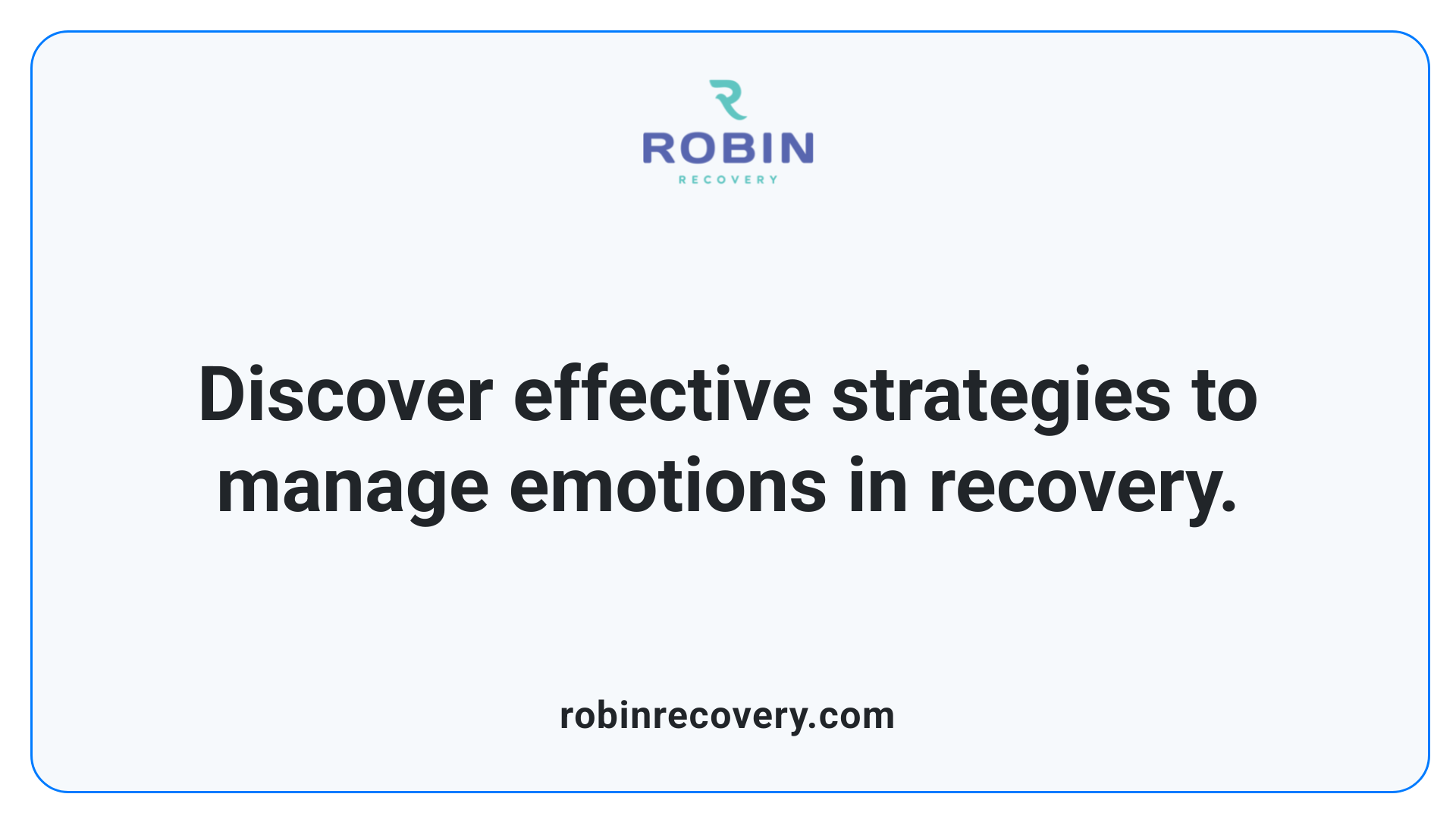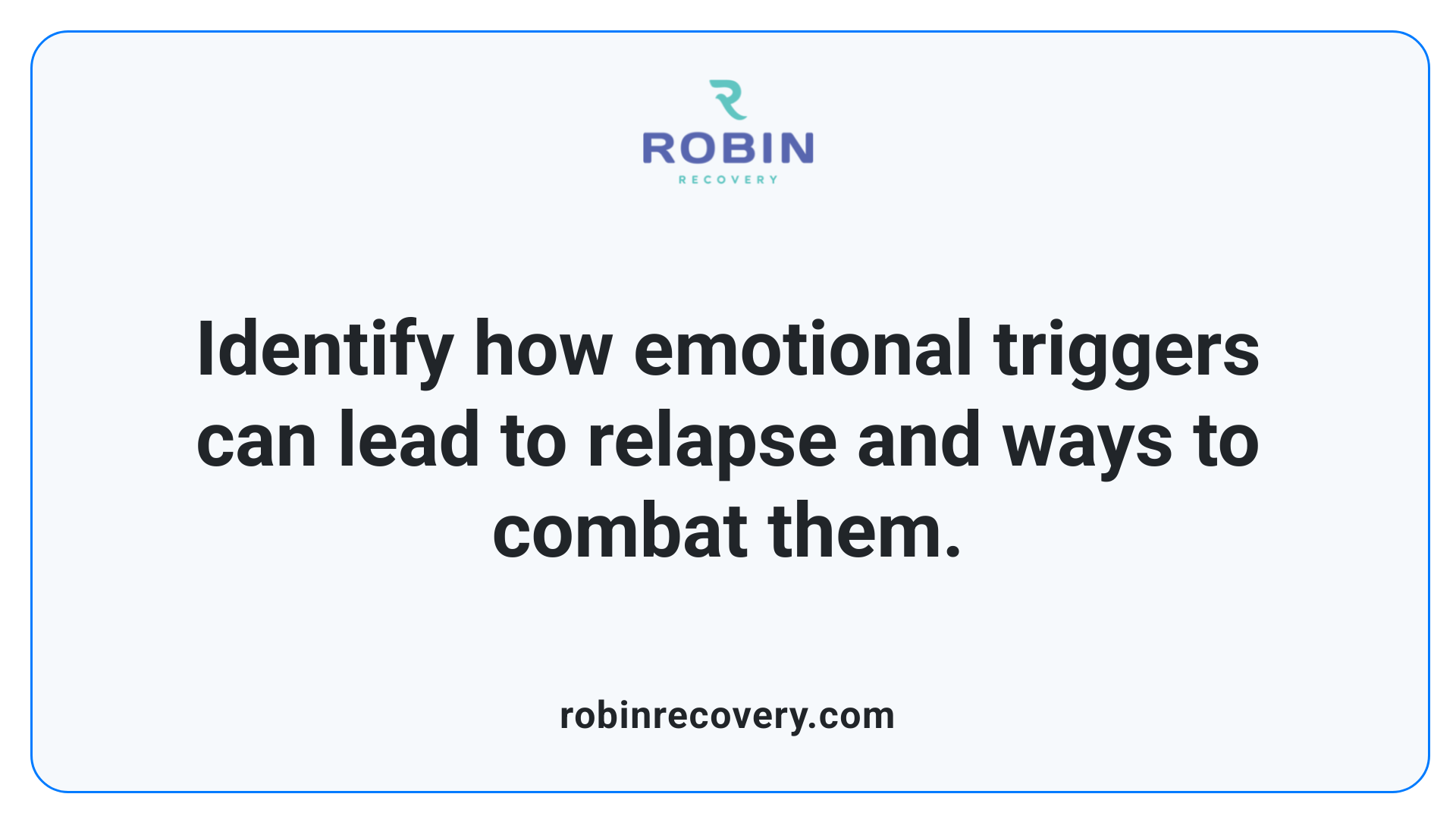How to deal with negative emotions during recovery

Understanding the Role of Emotions in Recovery
Recovery from addiction is not just about abstaining from substances; it is deeply intertwined with emotional management. Navigating the turbulent sea of emotions—ranging from depression to guilt—is a crucial aspect of the recovery journey. Addressing these emotional challenges head-on can lead to healthier coping mechanisms and prevent relapse. This narrative explores the intricate relationship between emotions and addiction recovery, providing insights and strategies to help individuals manage their feelings effectively.
Understanding Emotional Dynamics in Recovery

Impact of Emotions on Recovery
Positive emotions often lead individuals to make healthier choices, while negative emotions can trigger poor decisions. This is particularly critical during recovery from substance use disorders, where individuals navigate intense feelings such as anxiety, fear, and guilt. Those struggling with their mental health may fail to manage their emotions effectively, complicating their recovery journey.
Emotional Dysregulation and Addiction
Emotional dysregulation, or the inability to control emotional responses, is a significant risk factor for addiction and other mental health conditions. Effective recovery requires that individuals learn to manage their emotions, as unresolved feelings can propel them back to substance use as a coping mechanism. Treatment that integrates both addiction therapies and mental health support is crucial to address these intertwined issues.
Identifying Common Negative Emotions
Throughout recovery, individuals can encounter a range of negative emotions including:
- Shame: Often leads to avoidance and a reluctance to seek help.
- Guilt: Can spur reflections on past behaviors and hinder self-forgiveness.
- Anxiety: Frequently arises from withdrawal symptoms.
- Fear: Related to the uncertainty of recovery and potential relapse.
- Loneliness: Can exacerbate feelings of isolation and urge individuals towards substance use.
Recognizing and articulating these emotions is vital.
How do you deal with intense negative emotions during recovery?
Sitting with negative emotions means accepting and acknowledging them without judgment. Practice mindfulness, self-compassion, and express your feelings in healthy ways. Seek professional support if needed, and remember that healing takes time. Be patient with yourself, and you'll develop emotional resilience.
Strategies for Coping with Emotional Challenges

What strategies can help cope with emotions in recovery?
Coping with emotions in recovery requires developing effective strategies that foster emotional awareness and regulation. Here are some practical approaches:
- Physical Exercise: Engaging in regular exercise releases endorphins, which can enhance mood and decrease feelings of anxiety and depression. Activities like yoga or hiking also help clear the mind.
- Creative Expression: Journaling, painting, or playing music can provide an emotional outlet, allowing individuals to process their feelings constructively.
- Mindfulness Practices: Techniques like deep breathing and meditation can help manage overwhelming emotions by promoting relaxation and present-moment awareness.
- Structured Activities: Filling free time with purposeful tasks—like pursuing hobbies, completing chores, or trying new activities—can combat boredom and foster a sense of achievement.
- Healthy Distractions: Engaging in enjoyable activities, listening to music, or spending time with pets can shift focus from negative emotions and prevent impulsive reactions.
Importance of engaging in healthy activities
Participating in healthy activities is essential not only for emotional management but also for overall well-being in recovery. Here’s why:
- Combat Relapse Triggers: Engaging in meaningful and fulfilling activities can help mitigate feelings of loneliness, resentment, and depression, which often trigger substance use.
- Develop Positive Habits: Regular engagement in healthy activities establishes a routine that can increase feelings of stability and control in life.
- Build Connections: Activities involving social interaction create support networks that are vital in recovery, helping to reduce feelings of isolation.
Utilizing cognitive and behavioral skills learned during treatment enhances the capability to manage both emotions and boredom effectively, contributing to a healthier recovery process.
Flushing Out Negative Emotions: Methods for Relief
What methods can flush negative emotions out of the body?
There are several effective methods to flush negative emotions out of the body. One of the most beneficial practices is mindfulness and meditation, which help individuals become more attuned to their thoughts and feelings. This awareness fosters the release of negative emotions by allowing individuals to process them rather than suppress them. Short bursts of mindfulness can significantly reduce emotional turmoil and enhance emotional regulation during stressful times.
Why is physical activity essential in managing emotions?
Engaging in physical activity serves as a formidable outlet for emotional energy. Activities like running, yoga, or even dancing not only help in channeling pent-up feelings but also trigger the release of endorphins, the body’s natural mood lifters. Regular exercise not only improves overall mental health but also reduces stress and anxiety, creating a positive cycle of emotional well-being.
How can creative expression aid emotional processing?
Creative outlets such as art, music, or writing provide powerful means for expressing and processing feelings. These activities allow individuals to externalize their emotions, making it easier to comprehend and manage them. Engaging in creative expression can lead to profound emotional release, assisting individuals in navigating their recovery journey with clarity and purpose.
Method Benefit Details Mindfulness and Meditation Enhances awareness and emotional release Short sessions calm the mind Physical Activity Boosts mood through endorphin release Exercises like yoga improve resilience Creative Expression Facilitates emotional processing Art and writing allow for self-reflection
Therapeutic Approaches and Self-Care

What self-care and therapeutic approaches aid in emotional management during recovery?
Self-care and therapeutic approaches play a crucial role in managing emotions effectively during recovery from addiction. Engaging in physical self-care, such as regular exercise, eating a balanced diet, ensuring adequate sleep, and maintaining good hygiene, fosters overall health and aids emotional stability. These activities not only boost physical well-being but also have a significant impact on mood regulation.
Mental health support through therapy is another vital component. Working with a therapist allows individuals to explore their emotions, learn coping strategies, and develop emotional intelligence. Cognitive Behavioral Therapy (CBT) and Dialectical Behavioral Therapy (DBT) are especially effective in providing tools for emotional self-regulation and addressing maladaptive thoughts.
Additionally, integrating self-care practices such as mindfulness, meditation, and creative outlets into daily routines can enhance emotional resilience. Mindfulness techniques help individuals stay grounded, reducing anxiety and stress, while creative expression offers an alternative way to process emotions. Establishing healthy boundaries and nurturing supportive relationships are also fundamental to emotional well-being during this challenging time.
Self-Care Practices Therapeutic Approaches Benefits Regular Exercise Cognitive Behavioral Therapy (CBT) Enhances mood, reduces stress, improves emotional stability Balanced Diet Dialectical Behavioral Therapy (DBT) Provides coping strategies, addresses maladaptive thoughts Adequate Sleep Individual and Group Therapy Offers emotional support, fosters community connection Mindfulness and Meditation Mindfulness-Based Techniques Promotes relaxation, helps individuals stay present Engaging in Creative Activities Support Groups Provides emotional validation, encouragement
Incorporating these approaches not only assists in coping with negative emotions but also fosters growth and recovery, ultimately enhancing the quality of life.
Understanding Emotional Triggers and Relapse

Emotional Triggers Leading to Substance Use
Individuals in recovery often encounter emotional triggers that can lead to substance use. Negative emotions such as anxiety, guilt, and anger frequently resurface, especially after the numbing effects of substances wear off. These feelings can become overwhelming, leading individuals to seek relief through substance use again. Understanding that emotions can act as relapse triggers is essential; feelings of loneliness or disappointment can propel someone back into addictive behaviors. Recognizing when these emotional challenges arise can help in proactively developing coping strategies.
Strategies to Avoid Relapse
To mitigate the risk of relapse driven by emotional triggers, individuals can utilize various strategies:
- Coping Techniques: Techniques such as mindfulness and meditation help ground individuals, allowing them to observe their emotions without judgment.
- Physical Activity: Regular exercise releases endorphins, improving mood and combating feelings of stress and anxiety.
- Journaling: Writing down thoughts and feelings helps in identifying emotional patterns, aiding individuals in understanding triggers better.
- Seek Support: Building a strong network of support through therapy, family, or support groups provides emotional validation and accountability.
- Cognitive Restructuring: Cognitive Behavioral Therapy (CBT) can effectively address and restructure negative thoughts associated with distressing emotions.
- Distraction Techniques: Listening to music or engaging in hobbies can offer temporary relief to prevent impulsive reactions to emotional triggers.
By implementing these strategies, individuals can better manage their emotions, significantly decreasing the risk of relapse.
Building Emotional Resilience for Long-Term Recovery

Importance of Developing Emotional Resilience
Emotional resilience is crucial for navigating the complexities of addiction recovery. It entails effectively managing stress and negative emotions without reverting to substance use. Individuals will likely encounter a mix of feelings such as anxiety, guilt, and shame during recovery. An essential aspect of building resilience is recognizing and processing these emotions rather than allowing them to overwhelm or dictate one’s actions.
Developing coping skills like mindfulness, journaling, and physical activity can foster emotional regulation. For example, mindfulness practices help individuals stay grounded in the present, alleviating feelings of fear or hopelessness. Furthermore, engaging in creative outlets can channel emotional turmoil into productive expressions.
Building Supportive Networks
Having a strong support network is instrumental in promoting emotional resilience. Connecting with supportive family members, friends, or support groups provides encouragement and accountability throughout the recovery journey. These relationships can mitigate feelings of loneliness, a common challenge in recovery, by providing a sense of belonging.
Support networks also serve as a resource for emotional validation, helping individuals process their experiences and challenges. Participating in therapy or group sessions can enhance emotional intelligence, allowing individuals to communicate their needs more effectively and navigate conflicts. By nurturing these connections, one can better handle the emotional ups and downs inherent in recovery.
Embracing Emotional Growth in Recovery
The path to recovery is as much about emotional growth as it is about physical sobriety. By embracing and managing negative emotions through mindfulness, healthy coping mechanisms, and supportive networks, individuals can foster an environment of healing and resilience. Understanding emotions not only aids in preventing relapse but also cultivates a fulfilling and empowered life beyond addiction. Remember, while recovery might be a journey filled with emotional challenges, it also offers a profound opportunity for personal transformation.
References
- Depression, Anger, & Addiction: The Role of Emotions in Recovery
- Coping with Emotions in Recovery | Los Angeles Outpatient Treatment
- Learning to Express Negative Emotions in a Healthy Manner
- 7 Ways to Manage Emotions in Recovery -
- Emotion differentiation in early recovery from alcohol use disorder
- How To Handle Negative Emotions Without Drugs Or Alcohol
- Managing Your Emotions to Keep Your Recovery on Track
